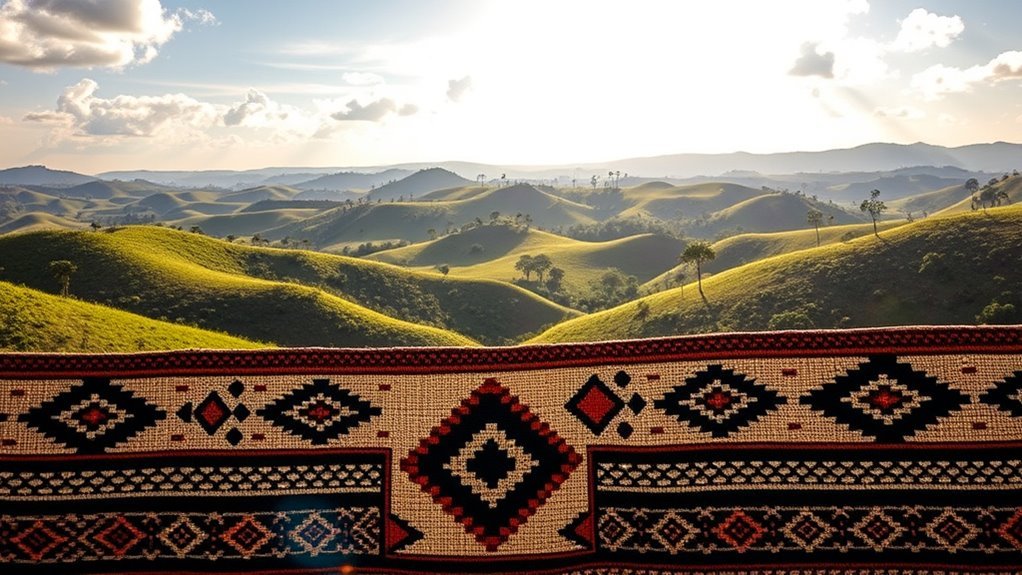Burundi offers diverse money-making ventures. Agriculture, the primary driver, presents opportunities in key export crops and diversification. Craftsmanship, basketry, and textiles can be leveraged through effective marketing. Emerging sectors like fintech, renewable energy, and sustainable agriculture have untapped potential. Tourism, with its natural beauty and eco-lodges, is a growth sector. Smart investment in Burundi’s agriculture promises improved income with new technologies. Rusizi National Park also fosters further tourism investment. More details await!
Main Points
- Invest in Burundi’s agriculture, particularly coffee, tea, rice, maize, or beans, and implement productivity technologies.
- Capitalize on handcrafted goods like basketry and pottery by improving marketing and ensuring fair prices for artisans.
- Explore emerging sectors like fintech, solar energy, and organic farming to tap into untapped potential.
- Develop eco-lodges and quality hotels to cater to the growing interest in Burundi as a tourism destination.
- Leverage technology through online platforms and mobile applications to improve income and access wider markets.
Leveraging Burundi’s Agricultural Assets
Given that agriculture is the primary economic driver in Burundi, opportunities abound for those looking to invest in the sector. Coffee and tea represent major export crops, offering potential for investors interested in cultivation or processing. Diversification into other crops such as rice, maize, and beans is also viable, addressing local and regional food security needs.
Livestock raising, particularly cattle, presents another avenue for economic engagement.
Improving breeds and promoting sustainable grazing practices can significantly increase yields. Investment in agricultural technologies, like irrigation systems and improved farming implements improves productivity. Such improvements can provide a stable income.
Capitalizing on Craftsmanship and Local Products

Burundi’s rich cultural heritage manifests in a variety of handcrafted goods, presenting opportunities for those interested in tapping into local artistry. Basketry, pottery, wood carvings, and traditional textiles represent key areas. Capitalizing on these products involves effective marketing and distribution strategies.
Entrepreneurs can focus on sourcing high-quality crafts, ensuring fair prices for artisans, and reaching wider markets through online platforms or partnerships with retailers.
Value addition through design innovation and adaptation to contemporary tastes can further enhance the appeal of Burundian crafts. Quality control and product consistency are also essential for success.
Exploring Opportunities in Emerging Sectors
Looking beyond the traditional sectors, emerging industries hold promise for investment and innovation. Burundi presents untapped potential in technology, renewable energy, and sustainable agriculture.
Investors should conduct thorough research to identify specific niches within these sectors. Opportunities exist for those willing to embrace innovation and navigate the evolving business landscape.
Here are some considerations:
- Technology: Focusing on Fintech solutions to bridge the financial inclusion gap, or developing mobile applications to provide access to services.
- Renewable Energy: Solar energy solutions, biogas production, and small-scale hydropower plants can address energy needs while promoting sustainability.
- Sustainable Agriculture: Investing in organic farming practices focusing on export crops to meet growing global demand.
Tapping Into Tourism and Hospitality
With its natural beauty and cultural heritage, Burundi’s tourism sector presents opportunities for growth, particularly in eco-tourism and cultural experiences. Investors can explore establishing eco-lodges, guided tours to national parks like Rusizi National Park, and cultural centers showcasing Burundian traditions.
Hospitality services are also crucial.
There is a demand for quality hotels, restaurants, and transportation services catering to both local and international tourists. Entrepreneurs can consider investing in these areas to enhance the overall tourism experience and capitalize on the growing interest in Burundi as a travel destination.
Common Questions
What Are the Best Online Money Transfer Services in Burundi?
Identifying top online money transfer services within Burundi requires considering factors like reliability and fees. Commonly used services may include WorldRemit, MoneyGram, and Western Union due to their global reach. Availability and local partnerships influence effectiveness.
How Safe Is It to Invest in Burundi?
Investment safety in Burundi is questionable. Political instability, corruption, and weak legal structures pose significant risks. Due diligence and careful evaluation are essential for potential investors navigating this challenging environment.
What Are the Major Political Risks?
Major political risks involve potential instability. Burundi faces risks of election-related violence, government repression, and regional conflicts, impacting economic stability and investment confidence. Ethnic tensions and governance issues may also undermine growth prospects.
What Are the Average Start-Up Costs in Burundi?
Startup costs in Burundi vary significantly. They depend on the business type, location, and scale. Microenterprises may require a few hundred dollars. Larger ventures can demand tens of thousands due to infrastructure, registration, and operational expenses.
Where Can I Find Reliable Business Mentors?
Reliable business mentors are available through local business incubators, chambers of commerce, and industry-specific associations. One might also seek guidance from universities or online mentoring platforms connecting entrepreneurs with experienced professionals.